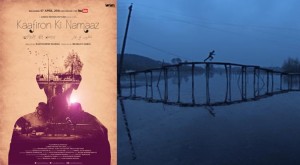FULL MOVIE:
One can understand why Kashmir – that of eternal conflict and beauty, irony and epiphany – is overly poeticized by storytellers. Gorgeous whispers, cold filters and heavy metaphors have over the years lent an unreal mysticism to the region. But frankly, no film or piece of literature can truly encapsulate the reality of forever waking up on the cusp of heaven and hell. Movies often stretch the land to accommodate opinions, protests, ideals and fierce theories of onlookers who have little idea about the volatility of human nature in strife.
Kaafiron Ki Namaaz is one such piece of work; it looks to have been made by angst-ridden young minds intent on exploring themselves instead of the medium they’ve chosen. In the process, what we get is – to put it crudely – a 140-minute long gabfest between two, occasionally three, pretentious men at a table in an abandoned Srinagar hotel on Christmas Eve. The setting sounds intriguing, but that’s all there is to it.
A Bengali writer (Chandrahas Tiwari) interviews an eccentric court-martialed army man (Alok Chaturvedi) for his new book. A cameraman, who is also narrating this incident to us in that typically annoying lyrical manner, records their interminable conversation. Throw in a tea-selling failed musician and a radio voice reading out confession letters at this ungodly hour, and we get a film that must have been made by the hour, one I don’t care to understand.

The writer is exceedingly whiny, his eyes always popping out with rage for no fathomable reason, his line of questioning resembling that of five-year old brat with daddy issues. There were times I just wanted him to be shot and done away with. It doesn’t help matters that they switch from Hindi to English – which isn’t even their comfortable language – for no real reason, and truly sound like they’re playing out someone else’s existential crisis.The army chap, who feeds off the writer’s frenzy initially, becomes equally insecure and vulnerable by the thousandth minute. The role-reversal is clear; any one of them is chain-smoking, drinking tea and acting like a sociopath at any point of time. Soon, one is doing yoga, the other weeping copiously and the third is doing a bit of both – just another day in the universe of Kaafiron Ki Namaaz.
After the film, when a colleague asked me what the initial scenes of a boy opening a window were about, I wondered if he was messing with me. On deeper thought, I remembered this vague opening scene – now a hazy memory numbed by the barrage of nothingness that followed. It felt like years ago, like reminiscing about a long-buried childhood incident. Independent films that look like they’re breaking norms and going against the grain don’t automatically become clever films. They still need to engage, arrest occasionally and perhaps even steal a bit of us into their complex maze of whims and fancies.
Not my cup of kahwa, this one.





Nice Post
Hi,
Thanks for nice post